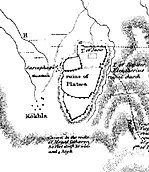
Back بلاتايا Arabic Plateya Azerbaijani Платэі Byelorussian Платея Bulgarian Platea (Grècia) Catalan Plataje Czech Platæa Danish Plataiai German Πλαταιές Greek Platea (ciudad) Spanish

Plataies and Plataea
Modern Plataies and ruins of the city of Plataea.
Topographical map of the ruins of Plataea.

Plataea (/pləˈtiːə/; Ancient Greek: Πλάταια, Plátaia) was an ancient Greek city-state situated in Boeotia near the frontier with Attica at the foot of Mt. Cithaeron, between the mountain and the river Asopus, which divided its territory from that of Thebes.[1] Its inhabitants was known as the Plataeans (Πλαταιαί; Plataiaí, Latin: Plataenae).
It was the location of the Battle of Plataea in 479 BC, in which an alliance of Greek city-states defeated the Persians.
Plataea was destroyed and rebuilt several times during the Classical period of ancient Greece. The modern Greek town of Plataies is adjacent to its ruins.
- ^ Strabo, Geography, ix. p.411. This page is an edited and updated version of an article in Smith's Dictionary of Greek and Roman Geography of 1870, p. 637.
© MMXXIII Rich X Search. We shall prevail. All rights reserved. Rich X Search

